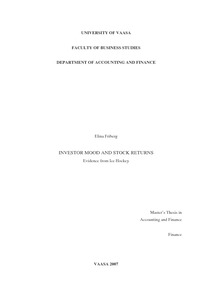Investor Mood and Stock Returns: Evidence from Ice Hockey
Friberg, Elina (2007)
Kuvaus
Opinnäytetyö kokotekstinä PDF-muodossa.
Tiivistelmä
Recent literature has investigated the impact of behavioral biases on asset pricing and one of these biases is shown to be investor mood. A number of studies have already documented a link between mood bias and stock returns. The objective of this thesis is to expand the existing evidence linking mood to asset prices and to investigate the stock market reaction to sudden changes in investor mood.
Motivated by the abundance of psychological evidence showing the strong effect that sports results have on mood, the purpose of this thesis is to investigate whether there is a link between sport results, investor mood and stock prices. Therefore, the results of international ice hockey games, which have particularly attractive properties as a meas-ure of mood, are used to examine the mood changes of investors.
The data used in this thesis consist of the price of broadly-based stock market indices of Czech Republic, Finland, Russia and Sweden. The time-series data for regression are formed by the closing price of the index, from which returns are defined logarithmi-cally. Indices from each country form a time-series between 1.1.1998 – 26.6.2007. Wins and losses in international ice hockey games of these countries are used to measure the sudden changes in investor mood. The games included in the study are the Olympic Games, World Championship games and World Cup games.
To estimate the effect of wins and losses on stock returns, a regression model is used. No negative stock market reaction after ice hockey losses is found, except for Czech Republic after elimination games. No evidence of positive stock market reaction after ice hockey wins can be found either. It can be concluded that in most of the cases losses have more profound impact on stock returns than wins and also in half of the cases more profound impact was found when examining only elimination games. Results suggest that it may be possible that the effect associated with winning or loosing an in-ternational ice hockey game is too small to influence the national stock market index.
Motivated by the abundance of psychological evidence showing the strong effect that sports results have on mood, the purpose of this thesis is to investigate whether there is a link between sport results, investor mood and stock prices. Therefore, the results of international ice hockey games, which have particularly attractive properties as a meas-ure of mood, are used to examine the mood changes of investors.
The data used in this thesis consist of the price of broadly-based stock market indices of Czech Republic, Finland, Russia and Sweden. The time-series data for regression are formed by the closing price of the index, from which returns are defined logarithmi-cally. Indices from each country form a time-series between 1.1.1998 – 26.6.2007. Wins and losses in international ice hockey games of these countries are used to measure the sudden changes in investor mood. The games included in the study are the Olympic Games, World Championship games and World Cup games.
To estimate the effect of wins and losses on stock returns, a regression model is used. No negative stock market reaction after ice hockey losses is found, except for Czech Republic after elimination games. No evidence of positive stock market reaction after ice hockey wins can be found either. It can be concluded that in most of the cases losses have more profound impact on stock returns than wins and also in half of the cases more profound impact was found when examining only elimination games. Results suggest that it may be possible that the effect associated with winning or loosing an in-ternational ice hockey game is too small to influence the national stock market index.
